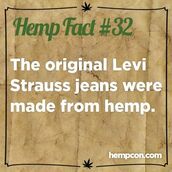
After signing the Farm bill and legalizing hemp in the United States last December, the industry has experienced exponential growth: “Reports and Data” suggest the market could be worth more than $13 billion by 2026. While hemp-derived CBD products are popping up everywhere, hemp also has major implications for sustainable clothing. Recently denim icon Levi Strauss & Co. has made significant progress in making this a reality.
Levi's, in March, unveiled a collaboration with the Outerknown that includes a pair of jeans and jacket made from a blend of 69% cotton and 31% hemp that the company claims feels like pure cotton. This is significant because hemp uses significantly less water and chemicals than cotton to produce. Hemp however, is a more difficult material to work with as the fibers come from the stalk of the plant whereas cotton is derived from a puffy bud at the top of the plant.
"It's a longer, stiffer, coarser fiber," stated Levi's head of global product innovation, Paul Dillinger, to Business Insider. "It doesn't want to be turned into something soft. It wants to be turned into rope." Levi's has formulated a way to soften the hemp fibers and able blend them with the cotton in a way that uses significantly less water than the process used to turn hemp fibers into a rough material. "It's great that it's resonating with the consumer, but it's more important that it's helping to future-proof our supply chain," he said.
"Our intention is to take this to the core of the line, to blend it into the line, to make this a part of the Levi's portfolio," Dillinger said; Entailing Levi’s hemp is an ongoing project that is intended to become a large part of the company’s bottom line and not just part of a niche market
Dillinger directed that Levi's is committed to improving the quality of its cottonized-hemp aiming for a 50/50 blend for most apparel, and 100% hemp for specific products. Dillinger also expects a cottonized-hemp garment that is all hemp and feels all cotton in the foreseeable future.
Dillinger expressed the need for cotton alternatives. Being familiar with the status of hemp, it wasn’t until European hemp research discovered by Levi’s, that the solution became apparent. Levi's would not reveal its partners or details of its breakthroughs, except to say that it had a market-ready material after three years.
When Levi's finds achieves production of 100% cottonized-hemp clothing, "We're going to go from a garment that goes from 3,781 L of fresh water, 2,655 of that in just the fiber cultivation," "We take out more than 2/3 of the total water impact to the garment. That's saving a lot."
Dillinger, although optimistic, quickly pointed out that he doesn't want hype around the hemp industry. Levi's and its competitors aren’t fully replacing cotton or revolutionizing the industry overnight. There is still many years of research and development, and it is likely that hemp will be one of many cotton alternatives.
"So often there's the assumption that to purchase a sustainably-made product is going to involve a sacrifice, and that the choice is between something ethically made or something that's cute," he said. "You don't have to sacrifice to buy sustainably." The idea behind the line is the customers won’t even know the difference.
Levi's, in March, unveiled a collaboration with the Outerknown that includes a pair of jeans and jacket made from a blend of 69% cotton and 31% hemp that the company claims feels like pure cotton. This is significant because hemp uses significantly less water and chemicals than cotton to produce. Hemp however, is a more difficult material to work with as the fibers come from the stalk of the plant whereas cotton is derived from a puffy bud at the top of the plant.
"It's a longer, stiffer, coarser fiber," stated Levi's head of global product innovation, Paul Dillinger, to Business Insider. "It doesn't want to be turned into something soft. It wants to be turned into rope." Levi's has formulated a way to soften the hemp fibers and able blend them with the cotton in a way that uses significantly less water than the process used to turn hemp fibers into a rough material. "It's great that it's resonating with the consumer, but it's more important that it's helping to future-proof our supply chain," he said.
"Our intention is to take this to the core of the line, to blend it into the line, to make this a part of the Levi's portfolio," Dillinger said; Entailing Levi’s hemp is an ongoing project that is intended to become a large part of the company’s bottom line and not just part of a niche market
Dillinger directed that Levi's is committed to improving the quality of its cottonized-hemp aiming for a 50/50 blend for most apparel, and 100% hemp for specific products. Dillinger also expects a cottonized-hemp garment that is all hemp and feels all cotton in the foreseeable future.
Dillinger expressed the need for cotton alternatives. Being familiar with the status of hemp, it wasn’t until European hemp research discovered by Levi’s, that the solution became apparent. Levi's would not reveal its partners or details of its breakthroughs, except to say that it had a market-ready material after three years.
When Levi's finds achieves production of 100% cottonized-hemp clothing, "We're going to go from a garment that goes from 3,781 L of fresh water, 2,655 of that in just the fiber cultivation," "We take out more than 2/3 of the total water impact to the garment. That's saving a lot."
Dillinger, although optimistic, quickly pointed out that he doesn't want hype around the hemp industry. Levi's and its competitors aren’t fully replacing cotton or revolutionizing the industry overnight. There is still many years of research and development, and it is likely that hemp will be one of many cotton alternatives.
"So often there's the assumption that to purchase a sustainably-made product is going to involve a sacrifice, and that the choice is between something ethically made or something that's cute," he said. "You don't have to sacrifice to buy sustainably." The idea behind the line is the customers won’t even know the difference.

